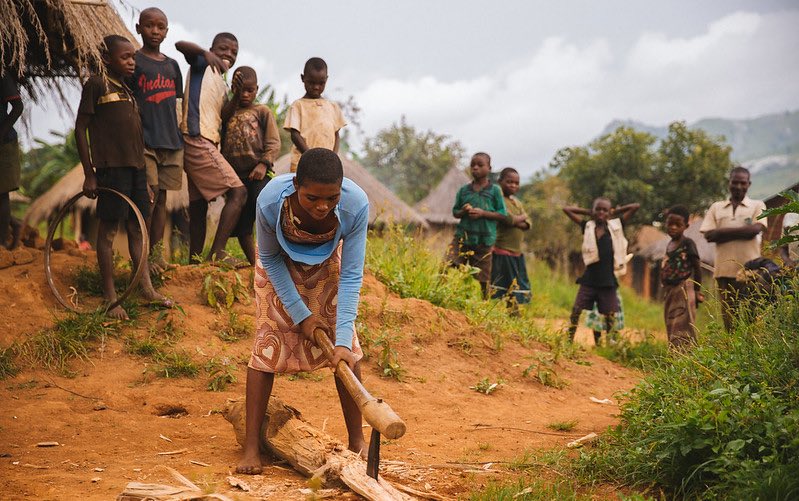More than 20 million young people aged 15-24 join the workforce in Africa south of the Sahara every year. These young job seekers will need to find work in today’s more competitive global economy, and not everyone thinks they will be successful.
Many governments are concerned about the prospect of widespread youth unemployment and the political unrest that this “youth bulge” could bring. Concerns are perhaps greatest for rural Africa, where global poverty is concentrating and job opportunities beyond smallholder farming are few and far between.
Although creating enough jobs in Africa is a daunting challenge, there are reasons for optimism. Many people highlight the fact that younger Africans are generally better educated than older generations and are often more comfortable with new technologies.
Young people may be better equipped to use modern farming practices, start new businesses in rural areas, or take advantage of opportunities in Africa’s growing cities.
In short, many people think young job seekers could be the “agents of change” that rural Africa sorely needs.
It turns out, though, that the concerns and optimism about African youth is not well grounded in evidence. In our new book, Youth and Jobs in Rural Africa, we revisit the so-called facts that underpin much of our understanding about the prospects of African youth.
A more careful look at the data reveals that Africa does not have a “youth problem,” but rather faces the broader challenge of promoting inclusive economic development. Moreover, while young people are better educated, this is no guarantee that they will be in the vanguard of rural development.
We compare Africa’s youth bulge to those of other developing regions and find that, while Africa’s youth bulge is late, its scale is not unprecedented. The share of youth in Africa’s workforce today is similar to what it was in other regions back in the 1970s and 1980s.
Africa’s economic performance today is also, by some measures, better than it was in other regions back when their youth populations peaked. This should make us more hopeful about Africa’s ability to address its own demographic transition.
Our coauthors revisit the assumptions made about youth in rural Africa.
It is commonly believed that youth, with their better education, will lead the way in modernizing agriculture.
However, evidence from household surveys in five African countries suggest otherwise.
Young farmers in Ethiopia, Ghana, and Malawi are less likely than older farmers to use improved seeds and fertilizers or receive advice from extension officers.
The larger problem, however, is that young and older farmers alike have limited access to new technologies and that, even when used, these technologies may not make farming much more productive.
It also often assumed that the youth are more likely to start and run successful businesses. This turns out to be true in Ethiopia, Ghana, Senegal, and Tanzania. However, the non-farm sector in these countries remains small and creates few jobs.
Moreover, despite being better educated, young people often run less productive businesses, such as informal trading. So even when youth are actively participating in rural transformation, it may still be their elders who benefit more.
Urban migration is often seen as a pathway that favors youth. Young workers in Malawi and Tanzania are more likely to migrate to cities and towns, and this raises their incomes and benefits their households back in rural areas.
But most young migrants do not move to urban centers, but rather to other rural areas where they continue to work in agriculture. So, while youth are more inclined to migrate, their role in linking rural areas to urban opportunities should not be overstated.
Ultimately, for younger and older Africans alike to prosper, they need policies that produce better economic opportunities overall—not policies that narrowly focus just on youth or technology.
While job creation is a major goal for most African governments, the needs of rural job seekers are not well-represented in policies.
A review of African policies reveals that labor supply issues, such as skills development, are paid far more attention than labor demand issues, such as stimulating private sector growth.
Education is not enough—evidence from Ghana and Tanzania shows that a successful rural enterprise depends on access to roads and electricity and on the broader economic environment.
Substantial policy reforms and investments are needed to create enough jobs in Africa. The good news is that there is a clear alignment of interests and incentives. Surveys show that young Africans are only slightly more likely than adults to protest, but they are more often motivated by concerns about unemployment.
To avoid youth protests, governments need to assure young people that their policies are aimed at enhancing the youth’s long-term job prospects rather than simply mobilizing short-term political support.
Africa can avoid widespread youth unemployment, just as other regions have, but this will require policies that help whole economies to flourish and create better jobs for everyone.
James Thurlow is a Senior Research Fellow with IFPRI’s Development Strategy and Governance Division; Valerie Mueller an IFPRI Non-Resident Fellow and Assistant Professor at Arizona State University; Julia Wilson is an IFPRI Communications Intern. This post first appeared on The Africa Report.







